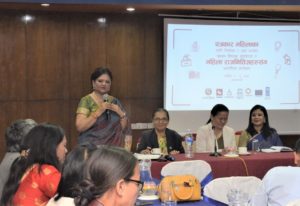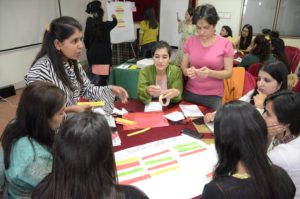Even successful professional women often continue to face discrimination in Nepal. In order to overcome such barriers in relation to elections, Sancharika Samuha, an organisation supporting woman journalists, organised an interaction programme from 18 to 20 October in Lalitpur. The first two days consisted of a workshop with women in journalism and the important role they can play during elections to include a gender perspective in reporting; the last day was an interaction between women in journalism and women political leaders. The event was designed not only for capacity enhancement, but also networking.
Twenty-four journalists representing different types of media, including television, radio, print and online, as well as national and local, state-owned and private, partook in the event. The women shared their professional experiences, the challenges and ways to overcome them. Most participants echoed that women in journalism seldom receive the opportunity to cover the political newsbeat, including elections. To this, UN CEDAW Vice-Chair Bandana Rana, asserted the importance of women breaking stereotypes to cover a variety of topics. She encouraged the participants to ensure that their voices are heard through reporting. The workshop emphasized the importance of having a balanced gendered perspective in reporting.

In the workshop, Surya Aryal the Under-Secretary at the Election Commission, Nepal (ECN) led a session on the role of media in elections. He explained that the ECN is open for the journalists to approach with any queries they may have, adding that the ECN has a Media Centre to specifically cater to the media.
The event concluded with a meeting between the journalists and female politicians. The group of 24 journalists were joined by 26 political leaders. “We want to strengthen coordination and collaboration between women in journalism and women in politics,” stated Babita Basnet, one of the facilitators at the event who is actively engaged in writing about various societal issues as a Media Expert herself. The Chief Guest, Deputy Speaker of the House of Representatives, Shivamaya Tumbahamphe, said that journalists should support women in politics. She emphasized that their voices should be equally represented in the media as their male counterparts.
The event proved to be an effective platform to discuss solutions to common problems, for women to unite and work collectively to advance their professions and ensure a women-friendly professional environment. Sancharika Samuha will organize three similar events at the provincial level over the coming weeks to ensure sensitization on these matters at the grassroots. This series of events is supported by the ECN, the European Union, UNDP and UNESCO.

The Electoral Support Project- Phase II (ESP) is a technical assistance initiative which focuses on a long-term institutional and professional capacity development of the Election Commission Nepal (ECN) to conduct credible, inclusive and transparent elections. The objectives of the project are 1) to strengthen the capacity of the ECN to function as an independent and credible institution, 2) to allow the conduct of the election cycle in an effective, sustainable, and credible manner, and 3) to increase democratic participation, particularly for under-represented and disadvantaged segments of the Nepali society. The ESP is currently funded by the EU.
